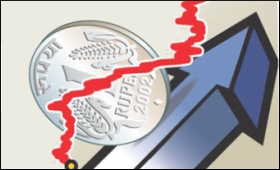|
|
|

|
Wholesale inflation rises to 1.32% in Sept
|
|

|
|
| Top Stories |
 |
|
|
|
SME Times News Bureau | 14 Oct, 2020
High prices of food products, primary articles and manufactured goods accelerated India's September wholesale inflation.
The
annual rate of inflation, based on wholesale prices, rose to 1.32 per
cent in September from 0.16 per cent in August, and from (-) 0.25 per
cent in July.
On a year-on-year (YoY) basis, the Wholesale Price
Index (WPI) data furnished by the Ministry of Commerce and Industry has
risen by only 0.33 per cent as against the corresponding period of the
previous year.
"The annual rate of inflation, based on monthly
WPI, stood at 1.32 per cent (provisional) for the month of September
2020 (over September 2019) as compared to 0.33 per cent during the
corresponding month of the previous year," the ministry said in its
review of 'Index Numbers of Wholesale Price in India' for September.
On
a sequential basis, the expenses on primary articles, which constitute
22.62 per cent of the WPI's total weightage, increased 5.10 per cent
from 1.60 per cent in August 2020.
The prices of food items remained at elevated levels with a rise of 6.92 per cent from 4.07 per cent reported for August.
On
commodity and sub-segment basis, potato prices increased by 107.63 per
cent in September against 82.93 per cent during August.
Overall, vegetable prices in September rose 36.54 per cent against a rise of 7.03 per cent in August.
Similarly, pulses became dearer by 12.53 per cent last month from 9.86 per cent in August.
On
a YoY basis, expenses on food items increased at a faster rate of 8.17
per cent from 7.54 per cent in the corresponding period of last year.
The
sub-segment of vegetable prices in September rose 36.54 per cent
against the decline of 19.3 per cent in the same month a year ago.
The cost of the fuel and power category declined (-) 9.54 per cent against a rise of (-) 6.68 per cent YoY.
Furthermore, the cost of the manufactured products category rose 1.61 per cent against a fall of (-) 0.42 per cent YoY.
The
data trajectory assumes significance as it fans further concerns over
stagflation, an economic trend which marks rising inflation and falling
gross domestic product (GDP).
On Monday, another key inflation
data point -- Consumer Price Index -- showed that a massive rise in food
prices spiked India's September retail inflation to 7.34 per cent from
6.69 per cent in August.
Though non-comparable, India had
recorded a retail price inflation of over 3 per cent in the
corresponding period of previous year.
The Reserve Bank of India,
in its latest monetary policy review, had maintained the key lending
rates on account of rising retail inflation.
"Similar to the
trend displayed by the CPI, the WPI inflation overshot our estimate for
September 2020 and rose to a seven-month high 1.3 per cent driven by a
quickening in the prices of food items," said Aditi Nayar, Principal
Economist, ICRA on WPI inflation.
"The primary food inflation
ratcheted up to an eight month high 8.2 per cent in September 2020, with
vegetables recording a distressing inflation of 36.5 per cent, despite a
high base. The pace with which vegetable prices recede back to more
normal levels will crucially guide the outlook for food and headline
inflation in the near term."
According to Sunil Kumar Sinha,
Principal Economist, India Ratings and Research: "WPI inflation is still
benign and expected to remain so despite its upward trajectory. but
retail inflation continues to remain outside the comfortable zone of
RBI."
"Although RBI is attributing the supply side disruption to
be the key reason of high retail inflation and expects it to cool down
to 4.3 per cent in 1QFY22, India Ratings and Research believes RBI will
go for a pause on policy rate in the remainder of FY21 but will
continue to take other measures for orderly functioning of financial
markets."
Sanjay Kumar, CEO & MD, Elior India, said: "The
increase in wholesale food inflation is a cause of concern, for two
reasons. One is that it limits any more scope for intervention of the
RBI in terms of reducing the repo rate any further. At the other end,
it force-puts a dampener on consumption because of the fact that the
tax-paying population is already under stretch due to job losses and the
economic contraction."
"Hence, a probably more aggressive
approach to ramping up of both government public spending as well as
taking an aggressive stance on fiscal policy by enabling consumption.
The recent announcement by the government with regards to compensation
laws will hopefully spur some demand."
|
|
|
| |
|
|
|
|
|
|
|
|
|
|
|
|
|
|
| |
| Customs Exchange Rates |
| Currency |
Import |
Export |
US Dollar
|
₹91.2
|
₹89.5 |
UK Pound
|
₹123.35
|
₹119.35 |
Euro
|
₹107
|
₹103.35 |
| Japanese
Yen |
₹57.9 |
₹56.1 |
| As on 22 Jan, 2026 |
|
|
| Daily Poll |
 |
 |
| What is your primary "Make or Break" expectation from the Finance Minister this year? |
|
|
|
|
|
| Commented Stories |
 |
|
|
|
|
|
| |
|